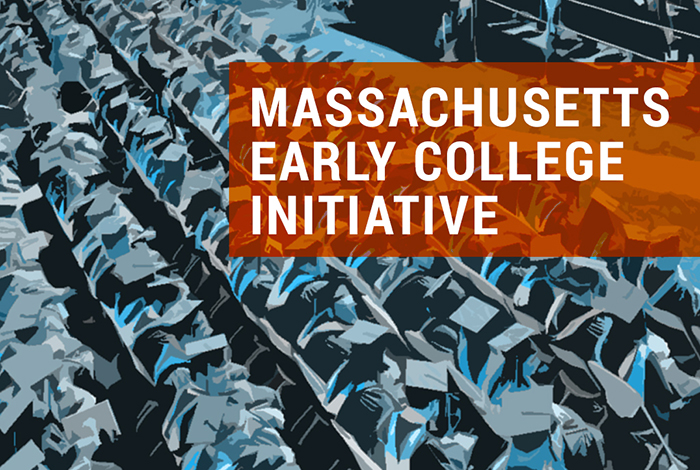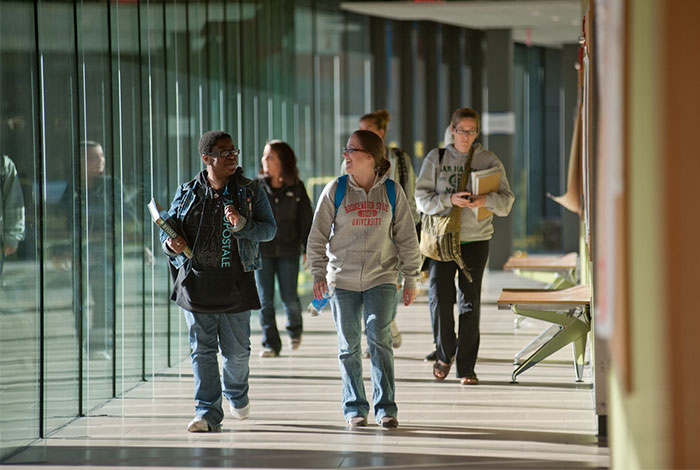Bridgewater, MA – January 24, 2017 – Today the Board of Elementary and Secondary Education (BESE) and Board of Higher Education (BHE) voted unanimously to adopt a joint resolution to prioritize and advance the early college efforts in Massachusetts, including the creation of an Early College Joint Committee. Early college high schools are schools that combine the traditional high school experience with the opportunity to earn significant college credit on an intentional pathway in a rigorous, highly supportive environment.
The Boards affirmed their shared commitment to helping students attain the knowledge, skills and abilities needed to succeed in college and careers, be engaged citizens and lead productive and fulfilling lives. The Boards recognized that early college programs that allow high school students to experience and complete college level academic work and reduce the time and expense of earning a college credential can be a powerful tool to achieve the Commonwealth’s overall goals for educational achievement.
“The joint resolution adopted by the boards today is part of the Baker-Polito Administration’s larger strategic efforts to strengthen career pathways, including more opportunities for students to engage in early college programs, and to ensure students are on a path to succeed in school, in their careers, and in life,” said Secretary of Education Jim Peyser. “Today the members of both boards expressed our appreciation to Parthenon-EY and the Barr Foundation, the members of the Steering Committee, and the Working Group, and look forward to the Early College Joint Committee’s recommendations in helping us build a scalable statewide early college initiative.”
“For all students, particularly first-generation and those traditionally underrepresented in postsecondary education, early college is an opportunity to engage in college-level work, develop a deeper understanding of the college experience, and get a jumpstart on their college degree,” said Chris Gabrieli, Chairman of the Board of Higher Education. “We are pleased to work with schools and communities to help create new programs to support students in early college and through high-quality career pathways by 2018.”
“We are proud that local school districts, postsecondary institutions, and non-profit organizations across the Commonwealth have pioneered early college models and promoted their expansion for many years,” said Paul Sagan, Chairman of the Board of Elementary and Secondary Education. “Early college programs can help improve high school graduation and college completion rates, and allow students an opportunity to experience career-related activities in a high-demand field or industry.”
“Massachusetts has traditionally focused on high performance and academic standards, and I am thrilled that we are now also addressing at a statewide level how high skills apply to a variety of careers,” said Nancy Hoffman, Senior Advisor, Jobs for the Future, and Chair of the Board of Higher Education’s Academic Affairs Committee. “We’ve learned lessons from around the country and are now able to build best-in-class early college programming.”
The joint resolution approved today established a 5-member Early College Joint Committee comprising the chairs of the BESE and BHE or their designees, an additional member of each board designated by the chairs, and the Secretary of Education, to oversee the development of a process for designating Massachusetts Early College Schools, working with both commissioners and departments to develop a process for reviewing, approving, overseeing, and evaluating applicants for the new designation as well as helping to guide the growth of the effort. A full proposal will be brought back to both boards for final approval by June 30, 2017.
The Early College Joint Committee is charged with designing, developing and coordinating the administration of a Massachusetts Early College program based on the process and key design principles set forth in Massachusetts Early College Schools. In January 2016, the Board of Elementary and Secondary Education and Board of Higher Education met together to discuss the topic of early college programming and to better understand the entire spectrum of early college models found throughout the Commonwealth. One result of the meeting was a joint expression of interest from BESE and BHE to further explore the early college landscape in Massachusetts. Through the support of the Barr Foundation and partnership with Parthenon-EY, a joint steering committee and working group was charged with exploring the role that early college pathways could play in helping improve college access and postsecondary completion in Massachusetts.
Parthenon-EY presented their initial findings to BHE in September 2016 followed by a presentation at the BESE’s December 20, 2016 meeting. The report, entitled Breaking Down Silos to Put Students on the Path to Success: The Promise of Early College in Massachusetts, was also discussed at today’s joint board meeting. The Parthenon-EY report highlights a number of advantages to the state’s use of early college high schools as a means of improving college access and postsecondary completion, particularly for first-generation college students, including the strategy’s alignment with state goals, the strong foundation of local early college programs, and the ability to achieve improved outcomes at reasonable costs.
This effort is consistent with a broader parallel initiative to define and develop high quality career pathways, for which the Commonwealth has just received a $2 million grant from the Council of Chief State School Officers and JP Morgan Chase.







